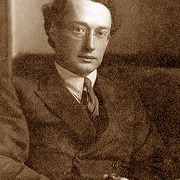I. A. Richards (1893–1979)
Author of Principles of Literary Criticism
About the Author
Image credit: Owen Barfield World Wide Website
Series
Works by I. A. Richards
The Meaning of Meaning: A Study of the Influence of Language Upon Thought and of the Science of Symbolism (1923) 296 copies, 2 reviews
How to read a page; a course in efficient reading, with an introduction to a hundred great words (2000) 46 copies
English Through Pictures, Book 1 and A First Workbook of English (English Throug Pictures) (Bk. 1) (2005) 9 copies
A first workbook of French: For use with French through pictures (Language through pictures series) (1960) 8 copies
Why so, Socrates? A dramatic version of Plato's Dialogues: Euthyphro, Apology, Crito, Phaedo (1964) 8 copies
English Through Pictures, Book 2 and A Second Workbook of English (English Throug Pictures) (Bk. 2) (2005) 6 copies
Il Francese per immagini 2 copies
Il Francese per immagini 2 1 copy
Hebrew readers 1 copy
Español Book 1 1 copy
La filosofia della retorica 1 copy
PLATO'S REPUBLIC 1 copy
A first workbook of Spanish: For use with Spanish through pictures Book I (A Washington Square Press book) (1963) 1 copy
ha-Kore ha-ʾivri 1 copy
Associated Works
Playbook: Five Plays for a New Theater — Contributor — 5 copies
Tagged
Common Knowledge
- Canonical name
- Richards, I. A.
- Legal name
- Richards, Ivor Armstrong
- Birthdate
- 1893-02-26
- Date of death
- 1979-02-07
- Gender
- male
- Nationality
- UK
- Birthplace
- Sandbach, Cheshire, England, UK
- Place of death
- Cambridge, Cambridgeshire, England, UK
- Places of residence
- England, UK
China - Education
- University of Cambridge (Magdalene College)
Clifton College, Clifton, Bristol, England, UK - Occupations
- critic
poet
teacher - Organizations
- American Academy of Arts and Letters (Foreign Honorary, Literature, 1963)
- Awards and honors
- Emerson-Thoreau Medal (1970)
Members
Reviews
Lists
You May Also Like
Associated Authors
Statistics
- Works
- 87
- Also by
- 5
- Members
- 1,783
- Popularity
- #14,439
- Rating
- 3.9
- Reviews
- 8
- ISBNs
- 117
- Languages
- 7
- Favorited
- 1















